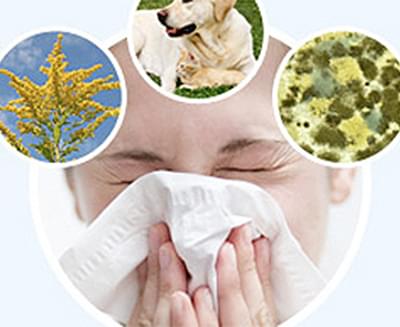
What Is an Allergy? Symptoms and Types of Allergies
An allergy is an overreaction of the immune system to substances that are typically harmless, such as pollen, dust, or certain foods. These substances, known as allergens, trigger immune responses that can affect various parts of the body.
Symptoms of Allergies
Allergic symptoms vary depending on the allergen but commonly include:
-
Runny or congested nose
-
Sneezing
-
Itching (nose, eyes, skin)
-
Watery and red eyes
-
Coughing
-
Shortness of breath
-
Skin rashes or hives
-
Nausea, vomiting, or diarrhea
Types of Allergies
-
Allergic Rhinitis (Hay Fever): Inflammation of the nasal passages due to allergens like pollen or dust mites.
-
Allergic Asthma: Airway inflammation triggered by allergens, leading to breathing difficulties.
-
Allergic Conjunctivitis: Eye inflammation caused by allergens.
-
Urticaria (Hives): Raised, itchy skin welts resulting from allergic reactions.
-
Food Allergies: Immune responses to specific foods.
-
Atopic Dermatitis (Eczema): Chronic skin condition characterized by dryness and itching.
-
Insect Sting Allergy: Severe reactions to insect venom, potentially causing anaphylaxis.
-
Anaphylaxis: A rapid, life-threatening allergic reaction requiring immediate medical attention.
Allergy Testing
Common diagnostic tests include:
-
Skin Prick Test: Introducing small amounts of allergens into the skin to observe reactions.
-
Patch Test: Applying allergens to the skin via patches to detect delayed reactions.
-
Blood Test (IgE): Measuring specific IgE antibodies in the blood to identify allergen sensitivities.
Allergy Treatment
Three primary approaches to managing allergies:
-
Avoidance: Steering clear of known allergens.
-
Medications: Using antihistamines, corticosteroids, and other drugs to control symptoms.
-
Immunotherapy: Gradual exposure to allergens to build tolerance over time.
Precautions for Allergy Sufferers
-
Breastfeed infants for at least 6 months if there's a high allergy risk.
-
Wear masks during house cleaning.
-
Avoid smoking and the use of perfumes or sprays.
-
Keep homes free of plants and pets.
-
Close windows during high pollen seasons and take protective measures when outdoors.
-
Steer clear of processed foods and additives.
-
Limit exposure to chemicals and strong odors.
Allergic reactions can escalate if not properly managed. It's crucial to consult healthcare professionals upon noticing symptoms to prevent complications.

